
Sailing in waves can be a jarring, juddering experience, making for a long and uncomfortable passage, a thrilling surfing ride to your destination or, at worst, a dangerous, boat-rolling hazard.
Understanding how to set up your boat for differing wave conditions, to take advantage of them or ameliorate their worst traits is a skill that it is well worth understanding and practising in order to make your sailing more enjoyable, and to give you the confidence to sail in a wider range of conditions.
DOWNWIND
‘Fairly obviously, the bigger the boat you sail the less of a problem waves generally are, say Merfyn Owen of Owen Clark Yacht Design, himself a double Cape Horner and former BT Global Challenge skipper with over 250,000 miles under his belt. ‘To take that to an extreme, if you think about an oil tanker in the middle of an ocean, a wave that would barely wet the deck for her would be something big enough to roll a cruising yacht. It’s really all about the wave energy transfer and the object that the energy is being transferred through, in this case, the boat. So although size is key, when sailing with waves, speed is very much your friend, too, as the energy transfer will be reduced when you are travelling at pace.’
Once surfing, don’t steer straight down the wave: you'll hit the one in front. If you stop, the wave will roll past and, significantly, your apparent wind angle will suddenly change. Instead, turn so the boat slides along the face of the wave, upwind or downwind of the wave perpendicular; this extends the time surfing but also keeps the boat ata constant speed.
‘When the wave hits, something has to happen to that energy, which is a function of the wave’s weight and speed. The energy is transferred into the vessel and if the vessel is going relatively slowly and is relatively small then there is sufficient energy in the wave to
This story is from the February 2020 edition of Yachting Monthly.
Start your 7-day Magzter GOLD free trial to access thousands of curated premium stories, and 9,000+ magazines and newspapers.
Already a subscriber ? Sign In
This story is from the February 2020 edition of Yachting Monthly.
Start your 7-day Magzter GOLD free trial to access thousands of curated premium stories, and 9,000+ magazines and newspapers.
Already a subscriber? Sign In

Midsummer on Hanö
This wonderful little island in the south-east of Sweden is a real gem off the beaten track
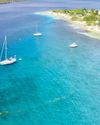
ADVENTURE SAILING TO HAITI
After spending two months in the Dominican Republic, Andy Brown sails west to Haïti bringing medical and school supplies to the town of Mole Saint Nicholas
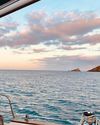
In celebration of bad sailing
New owner Monty Halls tests his sailing skills with his family aboard their Colvic 34 ketch, Sobek. A recently qualified Day Skipper, Monty faces a few unexpected challenges...

Winter brings excitement and opportunity
Oddity’s double glazing, insulation and heating create a warm, homely environment as I bash out this column.
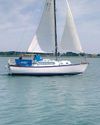
ADVENTURE MAISIE GOES TO GOES
To depart or not to depart? That is the question. Is it safer to stay, or suffer the wind and weather of a rough North Sea?
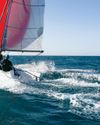
'MAYDAY, GRANDAD OVERBOARD!'
When David Richards and his grandson Henry went out racing from lowey, they didn't expect their sail to end with a lifeboat rescue
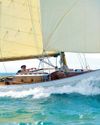
VERTUE
For a 25-footer, the Vertue has a huge reputation and has conquered every ocean. So what makes this little boat quite such an enduring success? Nic Compton finds out

Sailing siblings
Mabel Stock, her brother Ralph, a friend Steve and an unnamed paying passenger passed through the Panama Canal in December 1919 on the sturdy Norwegian cutter Ogre. They were towed to a quiet anchorage in Balboa away from the boat traffic but within rowing distance of the shore.
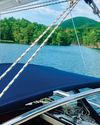
TECHNICAL MAINSAIL MODIFICATIONS
Safety and performance improved hugely when Mike Reynolds reduced the size of his mainsail and re-configured the systems controlling it
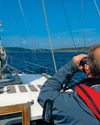
PILOTAGE DONE PROPERLY
Chartplotters are an amazing aid, but can detract from your real-world pilotage if not used with caution, says Justin Morton